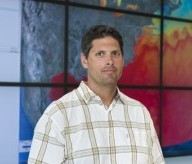 To celebrate Earth Week at the University of Delaware, this week and next we’re talking with faculty members from the College of Earth, Ocean and Environment.
To celebrate Earth Week at the University of Delaware, this week and next we’re talking with faculty members from the College of Earth, Ocean and Environment.
This week, it’s Matt Oliver, from the School of Marine Science and Policy. We discuss the nature of biological oceanography and how it differs from other fields that study the ocean and its wildlife, like marine biology and oceanography. We also talk about how the environment affects marine life and how geophysical events we can measure might cause changes in animal’s behavior or their distribution in a given area.
One example brought up is a collaboration with Delaware State University and the University of Rhode Island to study sand tiger sharks, one of the top predators in the Delaware Bay. We discuss the technology used, the methodology of studying the sharks and what purpose there is to performing these studies. Oliver also talks with us about our cultural fascination with sharks, and why we should keep our sense of awe when studying these creatures instead of reducing them to simple objects of study.
Listen to the Interview
Matt Oliver, CEOE
28:40
27.5 MB
About our Guest
Matt Oliver is an assistant professor in the University of Delaware’s School of Marine Science and Policy (College of Earth, Ocean and Environment). He oversees the Ocean Exploration, Remote Sensing and Biogeography Laboratory (ORB Lab) at the University of Delaware. Topics that he studies include ocean biogeography, remote sensing, phytoplankton, bioluminescence and genomic evolution.
Learn More
- College of Earth, Ocean and Environment homepage
- Earth Week home page
- The Tragedy of the Commons (Science Magazine, Garrett Hardin, 12/13/1968)
- Panel’s Wanring on Climate Risk: Worst is Yet to Come (New York Times, Justin Gillis, 3/31/2014)
- Underwater Robots Track Sharks Off US in a First (livescience, 10/19/2012)
- UDaily:
- Oceanographer Oliver to speak at National Academy of Sciences symposium (UDaily, Teresa Messmore, 10/29/2013)
- CEOE’s Oliver wins prestigious Presidential Early Career Award (UDaily, Elizabeth Boyle, 11/9/2010)
- UD, DBI join effort to track Gulf of Mexico oil spill (UDaily, Laura Crozier, 5/26/2010)
